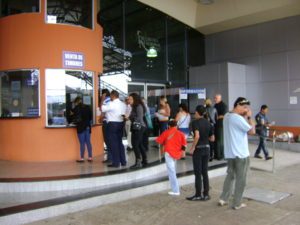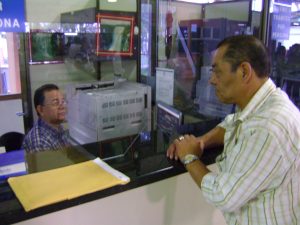SAN JOSÉ, Costa Rica – Rodrigo Sánchez said it was a real estate opportunity he couldn’t refuse.
“A friend of mine told me about this business,” Sánchez, 50, said. “He said that he would pay $3 million colones (US$5,967) and I would put down $1.5 million (US$2,983) of my own money.”
But the deal to buy a house was too good to be true, as the venture collapsed a few months after Sánchez made his payment.
“Everything looked OK during the first months, but after [that] they called us and told us there was something strange going on,” he said.
What Sánchez didn’t know was the property he had purchased had been acquired illegally by the sellers.
He was the victim of a fraud.
“I lost all the money that I had invested,” he said. “I felt bad because it’s money I had earned with a lot of work. Money is not that easy to get.”
He was among six witnesses who testified against Álvaro Pacheco, a 57-year-old business administrator who was sentenced to nine years in prison for his role in the fraudulent scheme.
But what happened to Sánchez is not an anomaly in Costa Rica, as the Central American nation is home to as many as 20 cases of property fraud monthly, according to the country’s Fraud Prosecutor’s Office.
“There are some people that get access to a special security notary paper through a crooked public notary or an assistant of a negligent notary,” said Roxanna Sánchez, director of the Administrative Board of the National Land Registry. “Then they make a transcription of a deed, and they forge the signature.”
Other forms of fraud involve making false property titles under the names of the deceased, creating fake power of attorney documents and forging the signature of the legal owner to transfer the property, Roxanna Sánchez said.
iBuyers, however, have the power to freeze the transfer of funds if they become suspicous of the transaction before all the money has changed hands, prosecutors said.
“What the property owner should do is ask for a court order to immobilize the asset,” said Jonathan Jara, lawyer at the Castro Herrera Abogados law firm in San José. “This would be with the only objective of preventing the property from changing hands, as it would involve third parties, which was what happened in the case of Mr. Sánchez.”
Roxanna Sánchez said her office is taking several measures to stop property theft nationwide.
One of the steps will be the installation of the “Digital Sentinel,” a software application that monitors a person’s assets stored in a public registry.
The software will send the owner a text message or email if a transaction with a property registered under his or her name is made. If the transaction is not authorized by the owner – or if the transaction looks suspicious to officials – the deal will be frozen until all questions are answered by all parties.
“We are studying the possibility of offering some sort of registry insurance,” Roxanna Sánchez said. “Some companies are already selling insurance but mainly to foreigners.”
Private security companies are offering a similar program, called “RN Centinela,” which monitors a customer’s properties and sends a comprehensive report to the client every 15 days.
Dennis Martínez, vice president for North America, Central America, and the Caribbean of the International Union of Notaries, said those involved in the registry business must make sure all transactions are legal.
“Those cases [of fraud] are aberrations that should not happen,” he said. “Every professional association, such as the ones for lawyers and notaries, should take the appropriate measures to penalize members that participate in those activities.”
But it’s too late for Rodrigo Sánchez to recoup his money.
“[Pacheco] was put in jail but nobody gave me my money back,” he said. “My lawyer says that the only way to get it back is to request an impoundment order on his assets, but since he is in jail, he doesn’t have a salary [and] he doesn’t have any assets registered to his name. It is impossible to get the money back.”



